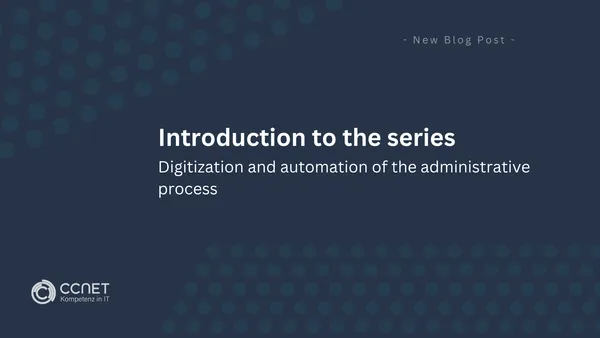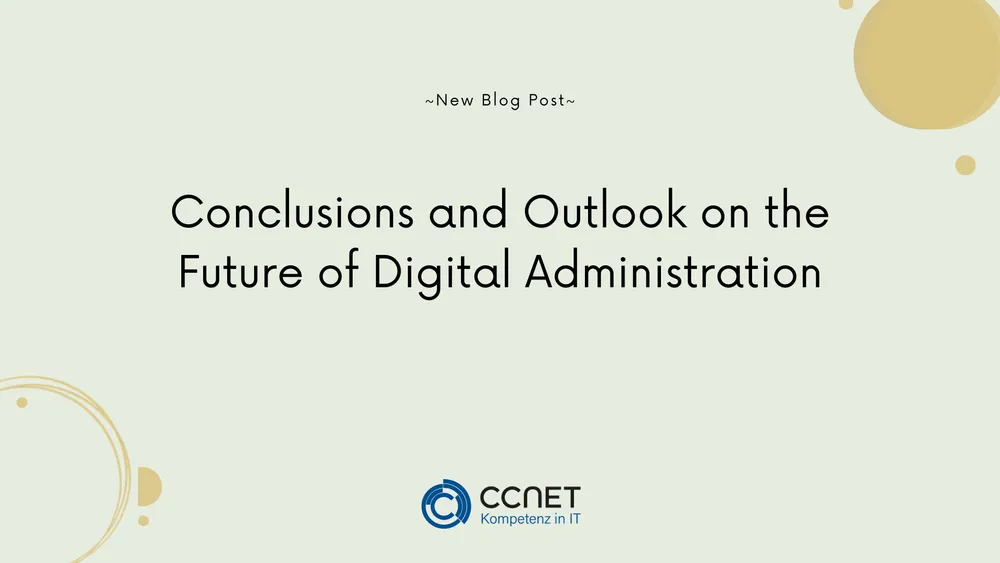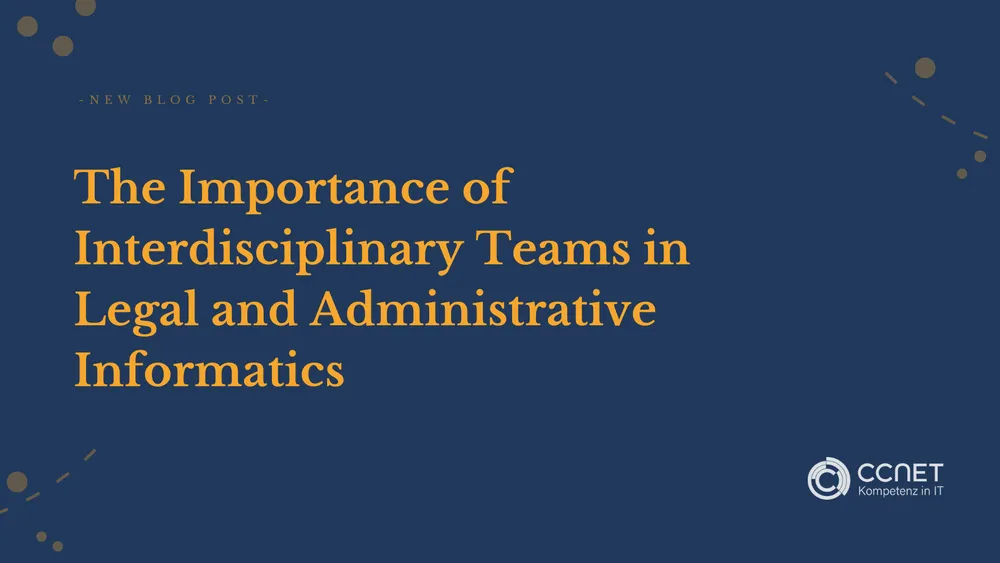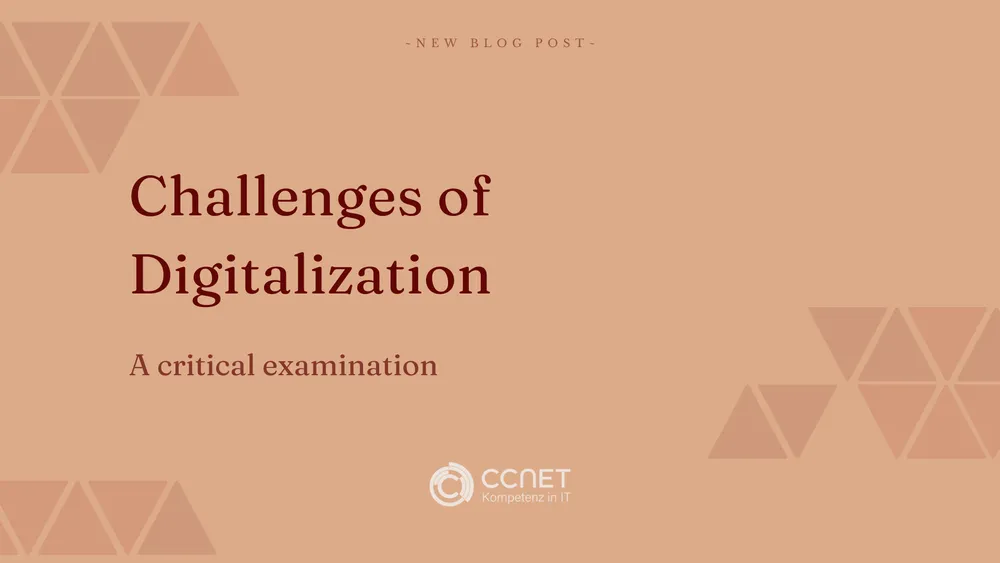
CCNet
Jun 17, 2024 • 3 min read

Introduction to the Series: Digitalization and Automation of Administrative Procedures
Welcome to our blog series on the digitalization and automation of administrative procedures! Introduction: In this series, we explore how modern technologies are fundamentally changing the legal and administrative landscape. We delve into the world of artificial intelligence, blockchain technology, and other innovations to demonstrate how these technologies contribute to making administrative processes more efficient, transparent, and accessible.
If you have any further questions, contact us: contact
What is Digitalization in Law?
Digitalization in law refers to the integration of digital technologies into the legal world. It involves using IT solutions and digital tools designed to optimize the processing, storage, and management of legal information. Through digital files, e-government services, and online legal consultations, not only is efficiency increased, but public access to justice is also improved.
What does Automation in Administrative Actions Mean?
Automation in administrative actions involves the use of technologies that conduct specific administrative processes without human intervention. Automated systems take over routine tasks such as filling out and processing forms, approving standardized applications, and even handling more complex operations like tax calculations or benefit allocation. These technologies help reduce processing times and significantly decrease error rates.
Why Are Digitalization And Automation Important?
Efficiency Improvement
One of the biggest benefits of digitalization and automation is the massive efficiency improvement in administration. Processes that used to require extensive manual input and lengthy processing times can now be completed in a fraction of the time. This leads to substantial cost savings and allows staff to focus on more complex and strategically important tasks.
Improved Access to Services
Through digitalization, administrative services are accessible 24/7 and regardless of location. This is especially beneficial for people in remote areas or those who, due to physical limitations, cannot attend administrative offices in person. Digitalization also reduces travel time and cost for all users significantly.
Transparency and Accountability
Digital systems enable better monitoring and documentation of administrative decisions. This increases transparency within public administration and strengthens public trust in its institutions. Additionally, it facilitates accountability in cases of errors or misuse. Stakeholders can easily access records, ensuring fairness in procedural activities.
Data Protection and Security
Digitalization also brings new challenges in data protection and data security. It is crucial to ensure that sensitive information is protected and that systems are secured against unauthorized access. Developing and implementing robust security protocols and practices is therefore a key aspect of digital transformation. Regular audits and compliance checks further enhance system integrity and trust.
Challenges and How They Can Be Addressed
Transitioning to digital systems does not come without challenges. Data protection concerns, adapting existing legal frameworks, and ensuring integration into existing systems are just some of the issues that need to be addressed. Careful planning, continuous monitoring, and regular updates are essential to overcome these challenges. Stakeholder engagement and training are crucial for smooth technological adoption.
Outlook
In the upcoming articles in this series, we will delve deeper into specific technologies and their applications in public administration. We will present successful examples of digitalization and automation and explore the legal, technical, and ethical aspects.
Stay tuned, because this transformative change in public administration promises to bring exciting opportunities and challenges!
What does digitalisation mean in law?
Digitalisation in law refers to the use of digital technologies to optimise the processing, storage and management of legal information. It includes digital files, e-government services and online legal advice to improve the efficiency and accessibility of the justice system.
What is meant by automation in administrative action?
Automation in administrative action means the use of technologies that perform administrative processes such as filling out forms, processing applications or calculating taxes without human intervention. This reduces processing times and error rates.
What are the data protection and security challenges associated with digitalisation?
Digitalisation brings new challenges in data protection and data security. It is crucial that sensitive data is protected and systems are secured against unauthorised access. Robust security protocols are required to meet these requirements.
How do digitisation and automation improve access to administrative services?
Digital systems make it possible to use administrative services around the clock and from any location. This is particularly beneficial for people in remote areas or those with physical limitations who are unable to visit administrative offices in person.
What advantages does automation offer for administration?
Automation leads to significant efficiency gains by taking over manual tasks, reducing errors and shortening processing times. This saves costs and allows employees to focus on more strategically important tasks.
What challenges must be overcome in the digitisation and automation of administration?
The challenges include data protection concerns, adapting existing legal frameworks and integrating new technologies into existing systems. Continuous monitoring and regular updates are necessary to overcome these challenges.
How will digitisation continue to change administration in the future?
Digitalisation will make administration more efficient and accessible. Future articles in this series will examine specific technologies and successful use cases to show how this transformation is progressing.


